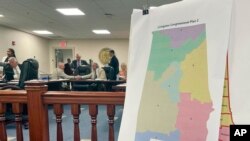The U.S. Supreme Court on Tuesday once again upheld a lower court decision mandating that the southern state of Alabama create a second congressional district in which Black voters are the majority.
It's the third time since June that federal courts have ruled that Alabama's congressional districts must accord with demographic data from the most recent census.
Alabama's Republican-controlled legislature repeatedly tried to bypass those orders with lawyers for the state arguing that their "2023 Plan applies the communities of interest principle fully and fairly to remedy … their challenge to the 2021 Plan."
The latest ruling upholds parts of the landmark Voting Rights Act in a state where more than 26% of voters are African American but only one of the state's seven congressional districts has a majority of Black voters. That one seat has a Black representative from the Democratic Party. The other six seats have white representatives from the Republican Party.
"Alabama is showing it feels it's OK continuing to operate in a system of racism and oppression," Travis Smith, a college professor in Chambers County, Alabama, told VOA. "They're supposed to be representing all of its residents, but lawmakers here have a long history of suppressing the voice of Black voters to give Republicans an advantage in elections."
Smith is hopeful the Supreme Court decision will have lasting effects on the lives of Black voters in Alabama.
"We can talk about how a lot of Black residents here don't have equitable access to medical care because Alabama's representatives to Congress don't support our interests," he said, "or we can talk about how our state has the most historically Black colleges or universities in the country but that they remain underfunded because our representatives don't advocate for resources. But, thanks to this decision by the judicial system, I think we will finally have access to power that will allow us to choose our representatives and to advocate for the needs of our communities and families."
Government interference or racial motives?
Republican voters say congressional redistricting has nothing to do with limiting the influence of Black voters. Rather, they say, it is the state legislature's job to create voting districts that best protect the interests of all communities in the state.
"Democrats are trying to make this all about skin color," Republican voter Tammy Robertson from Mobile, Alabama, told VOA, "but I don't think what we're asking for is racism. It's about saying the federal government and Supreme Court shouldn't be able to come in and tell us how to draw our own maps."
"I think it's crazy to think they understand the nuances of our state better than local legislators do," she added.
Following June's Supreme Court ruling, Alabama's legislature proposed creating a second district where 40% of voters were black. That was not good enough.
"The courts have ruled again and again that Black residents should be able to have a second representative of their choosing," said Julie Ebenstein, a senior staff attorney for the Voting Rights Project. "The state's map does not do that. And, to be frank, it's surprising any time a party doesn't follow the clear order of a federal court. Especially when it's stopping people from choosing their representatives."
Republican consultant Jay Williams says it was worth challenging the Supreme Court decision even though it failed.
"The worst-case scenario is the Alabama GOP will lose a seat," Williams told VOA, "But that would happen if they didn't challenge the decision, too. So why not try to test the resolve of the courts and see if someone changes their mind?"
University of Georgia political scientist Charles Bullock, however, says this gamble could prove far more damaging to Alabama Republicans.
"If Republicans would have followed the court's order from the beginning, they would have been allowed to redraw the map in a way that followed the mandate but also was most beneficial to them," Bullock explained.
"They would have lost a seat, but they could have created a map that pushed out one of their more junior representatives who doesn't have an important committee assignment," he continued. "But when the legislature didn't follow the court's mandate, the court hired a third-party special master to create the new maps."
Now, Bullock told VOA, that special master can create a map without regard to the preference of the Republican-controlled state legislature. The result will likely be a less friendly map than they could have drawn on their own.
Implications for 2024 election
With the 2024 election just over one year away, the decision could affect which party controls the House of Representatives.
"It's not likely to end with one seat in Alabama either," Bullock said. "There are similar battles taking place in Georgia, Florida, Louisiana, Texas and South Carolina. Democrats only have to flip five seats next year to gain control of the House, so if redistricting helps them in these states, it would be a huge advantage."
Collins Pettaway, a Black resident of Selma, Alabama, and the current chair of the Dallas County Democratic Party, is hopeful that what appears to be a victory in Alabama is the start of something bigger nationwide.
"I think Alabama is simply a microcosm of a larger ideological shift where people are fed up with racism, white supremacy and the silencing of Black voices," he said to VOA.
"For years Black voters in Alabama and in many southern states were left with the feeling their votes didn't matter. I think what's happening here proves that our voice is growing just in time for the next election."
A three-judge panel has scheduled a hearing for October 3 to choose from one of the three Alabama redistricting plans proposed by the independent special master.




